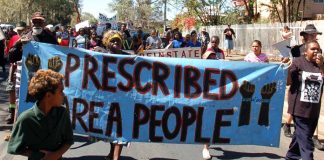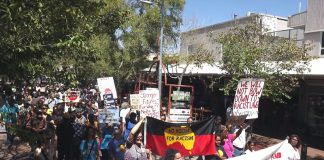More than 200 people attended the “Defending Indigenous Rights” conference, held in Alice Springs from July 6-9, to discuss the campaign against the NT Intervention.
Delegates from “prescribed” Aboriginal communities joined with students, workers, and activists, along with representatives of Amnesty International, the NSW Aboriginal Land Council and Indigenous media organisations from around Australia.
Strong voices from Yuendumu said they would continue to defy government blackmail and refuse to sign 40-year leases in exchange for housing. Muckaty traditional owners also told of their fight against a nuclear waste dump threatening their land.
On the final day, a 300 strong protest, one of the biggest in Alice Springs in recent years, marched to demand an immediate end to the Intervention, funding for real jobs, housing and services for all communities.
The conference inspired a number of students just coming into contact with the campaign. But politically it lacked focus.
There is still work to be done cohering the politics of the anti-Intervention campaign and developing a clear strategy for the coming period.
Some suggested actions, such as flooding the Human Rights Commission with complaints, or focusing energy on lobbying the United Nations, will do little to puncture the determination of a government committed to full-blown policies of assimilation.
The best sessions were focused on the grassroots campaign and building the campaign committees.
Jobs with justice
The closure of Community Development Employment Projects (CDEP) has created mass unemployment in Aboriginal communities. It drives the Intervention’s assimilationist aims by forcing migration into urban centres.
Under Labor’s “reformed” CDEP scheme, people are being forced to work just to receive their Centrelink payments, half of which are quarantined on the BasicsCard.
Two women from Epenarra told how the new scheme is making life far harder. One woman’s husband has been left working for the BasicsCard in the local store, which had been recently taken over by the government consortium Outback Stores. Other family members who used to receive over $300 per week on the old scheme are now working in the local clinic for only $120, plus rations on their BasicsCard.
Miguel Ociones, Alice Springs-based organiser with the Liquor, Hospitality and Miscellaneous Worker’s Union told the conference how more than 80 Aboriginal people have joined the LHMU through the Jobs With Justice campaign. Miguel said that working conditions in the bush are “the worst I have seen,” and called for a fight to force the government to “respect Aboriginal culture and allow people to live with dignity in their communities.”
Members of both the Stop the Intervention Collective Sydney (STICS) and the Melbourne Anti-Intervention Collective (MAIC) reported on the success of recent efforts to take the campaign to workplaces and the unions.
Peter Inverway, a BasicsCard worker from Kalkaringi, recently toured to speak to CFMEU and MUA stop work meetings in Sydney. His meetings in Melbourne helped to mobilise some union contingents to a recent demonstration.
The session resolved to push ahead with the Jobs with Justice campaign. A support statement condemned the impact of the Intervention on Aboriginal employment, and called for guaranteed Commonwealth funding to save 500 Shire jobs that are currently facing the axe in December and for massive investment in job creation for Aboriginal people.
The resolution also called on trade unions, state Labor Councils and the ACTU to endorse the statement, provide funds for its publication in a national newspaper and help mobilise members for a national day of action in September.
Defending Aboriginal languages
The conference also heard from Aboriginal teachers about the fight against the NT government policy restricting teaching in Aboriginal languages to just one hour per day.
Yirrkala teachers are openly defying the ban, while at Areyonga, teachers have initiated a legal challenge, claiming that the restrictions breach anti-discrimination legislation.
Teachers from Yuendumu, whose school had built up a curriculum in the Warlpiri language over decades, reported that it now sits unused in a school storeroom.
Yuendumu community member Frank Baarda said, “It’s not just Aboriginal land that this government wants, there are the rich languages, a whole way of seeing the world that they are trying to destroy.”
The conference noted the Australian Education Union’s opposition to the ban on bi-lingual education and resolved to work with the union to build more active opposition—with members’ forums, protest actions and a commitment to support teachers who are defying the ban.
A statement by women participants called for the resignation of Indigenous Affairs Minister Jenny Macklin.
By Paddy Gibson





